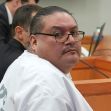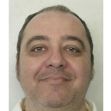In 1991, Willie B. Smith III and others abducted 22-year-old Sharma Ruth Johnson at gunpoint from an ATM, used her card to steal $80 from her account, and took her to a cemetery where Smith shot her in the back of the head. Johnson was the sister of a police detective.
Smith was convicted of robbery and murder. He was scheduled to be executed in Alabama at midnight on Thursday, February 11, 2021.
Smith, a Christian, asked that Pastor Robert Wiley, his pastor, be present at his execution. He filed a complaint to that effect. The lower court sent it to the Supreme Court, where the justices ordered that Alabama could not execute a death row inmate without his spiritual counselor by his side, and that they and other states must find a way to honor final requests for spiritual advisers in the death chamber.
Smith’s lawyers wrote in court documents, “Mr. Smith pled that he believes the point of transition between life and death is important, and that having his spiritual advisor physically present at that moment is integral to his faith.”
The Supreme Court’s order came an hour before Smith was to be executed.
The Supreme Court’s conservative majority was divided on this issue. Justice Amy Coney Barrett joined her liberal fellow justices, saying that federal law requires that states make accommodations for prisoners in these circumstances.
Justice Elena Kagan, whose opinion Barrett joined, said that federal law protects the religious rights of prisoners and that Alabama did not meet those protections. She wrote, “Prison security is, of course, a compelling state interest. But past practice, in Alabama and elsewhere, shows that a prison may ensure security without barring all clergy members from the execution chamber.
“Alabama has not carried its burden of showing that the exclusion of all clergy members from the execution chamber is necessary to ensure prison security. So the state cannot now execute Smith without his pastor present, to ease what Smith calls the ‘transition between the worlds of the living and the dead,’” Kagan wrote.
Justices Stephen G. Breyer and Sonia Sotomayor joined in Kagan’s opinion. The order did not specify how every member of the court voted. Justice Clarence Thomas said he would have allowed the execution to proceed, as did Justice Brett M. Kavanaugh and Chief Justice John G. Roberts, Jr. They said that Alabama’s ban “serves the State’s compelling interests in ensuring the safety, security and solemnity of the execution room,” and noted that Alabama’s ban of all clergy is nondiscriminatory.
Kavanaugh wrote that most of the court did not agree with his position and that other death-penalty states should pay attention. They “should figure out a way to allow spiritual advisors into the execution room, as other States and the Federal Government have done. Doing so not only would satisfy inmates’ requests but also would avoid still further delays and bring long overdue closure for victims’ families.”
Anand Agneshwar, one of Smith’s attorneys said, “The issue really comes up only when somebody makes a sincere request for this accommodation. It’s hard to see how states can come up with a good reason not to allow it,” particularly since federal executions allow it.
The executive director of the Death Penalty Information Center, Robert Dunham, said that although the Supreme Court did not rule on the constitutionality of a requirement to permit a spiritual adviser, the states “can make this issue disappear by simply permitting a religious advisor to be present. If they don’t it will continue to be an issue until the Supreme Court rules on the substance of one of these claims, rather than issuing shadow-docket rulings to grant or vacate stays of execution or preliminary injunctions.”
There’s history here for the Supreme Court. In 2019, a Muslim inmate, Dominique Ray, protested that Alabama only allowed a state-employed Christian chaplain to be with inmates in their final moments. The court split 5-4 to allow his execution to proceed with the state chaplain. Some conservatives in the majority said the result was because Ray filed his complaint too late.
Kagan’s dissent in that case included these words: “Ray has put forward a powerful claim that his religious rights will be violated at the moment the state puts him to death.”
A Texas execution was stopped a couple of months later because the state said it couldn’t accommodate a Buddhist prisoner’s request that a spiritual adviser be with him in the death chamber. Texas only allowed Christian and Muslim chaplains to attend executions at that time.
According to Kavanaugh’s decision in that case, the government “may not discriminate against religion generally or against particular religious denominations.” But then he said that states could make the problem moot by excluding all outsiders from the death chamber.
Alabama changed its policy as a result of the 2019 Ray decision and barred all clergy from the execution chamber, but Smith argued that did not meet the requirements of the Religious Land Use and Institutionalized Persons Act, a federal law protecting the rights of inmates. A panel of the U.S. Court of Appeals for the 11th Circuit agreed.
Kagan said Alabama’s defense that it had security concerns didn’t hold up and that the lower court was right. Until 2019, Alabama had required chaplains to be present. She wrote, “Alabama’s policy substantially burdens Smith’s exercise of religion” and would leave him “to die without spiritual attendance.”
Kagan quoted from Smith’s complaint, adding, “Smith understands his minister’s presence as ‘integral to spiritual search for redemption.’ His pastor, Smith says, will not only ‘relieve his struggle as he passes,’ but also help him ‘properly express to God his repentance.’”
Another stay was issued by the 11th Circuit related to Smith’s intellectual capacity and challenging the method of execution. That stay was vacated.
Diana Verm, a lawyer from The Becket Fund for Religious Liberty, filed an amicus brief in support of Smith. The brief said, “Allowing a spiritual adviser in the execution chamber to pray over someone as he passes over into death is an ancient and common practice. The federal government and multiple states have provided spiritual advisers to prisoners in many executions, including in 13 of the 20 executions carried out nationwide since 2020. Their practices show that what Smith requests can be done.”
Verm issued a statement saying, “If Willie Smith has to leave this world, he shouldn’t have to leave it all alone. Alabama used to know that, which is why it always required a chaplain to be with the condemned man until the end. Prisoners should be allowed to make peace with their Maker in their final moments.”
There have been no state executions since July 8, 2020.






